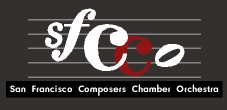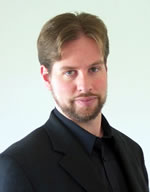SAN FRANCISCO COMPOSERS CHAMBER ORCHESTRA
Presents "Celestial Voyages: From Earth to the Heavens"
Saturday, May 4, 2024 at 8 pm
Lakeside Presbyterian Church
201 Eucalyptus Drive, San Francisco, CA
|
Hussein Al-Nasrawi is an accomplished pianist who graduated from San Francisco State University (B.M., 2018, and M.M., 2020), and was born to Iraqi parents. His passion for music is showcased through improvisation, by playing pieces by various composers, and by composing pieces representing people and places. |
|
|
James W. Cook is a summa cum laude graduate of the University of Alabama where he studied composition under Craig P. First. He recently received the First Runner-Up Award in the Nancy Bloomer Deussen Young and Emerging Composer Competition. |
|
|
Dr. Mark Alburger (1957-2023, Upper Darby, PA) was an award-winning, eclectic ASCAP composer with postminimal, postpopular, and postcomedic sensibilities. He was the Music Director of SF Composers Chamber Orchestra, SF Cabaret Opera / Goat Hall Productions, and The Opus Project; Editor-Publisher of 21st-Century Music and New Music; Adjunct Professor Emeritus of Music Theory and Literature at Diablo Valley College; and a Musicologist for Grove Online and Grove Dictionary of American Music. His principal teachers were Gerald Levinson and Joan Panetti (Swarthmore College, B.A.); Jules Langert (Dominican University, M.A.); Christopher Yavelow (Claremont University, Ph.D.); and Terry Riley. Dr. Alburger had composed 399 major works, including chamber music, concertos, oratorios, operas, song cycles, and symphonies. His complete catalogue was available from New Music. (markalburgerworks.blogspot.com) |
King David Suite (The Young and the Restless) I. O for the Wings of a Dove (Psalm 55) |
|
The multi-instrumentalist Michael Cooke is a composer of jazz and classical music. This two-time Emmy, ASCAPLUS Award and Louis Armstrong Jazz Award winner plays a variety of instruments: you can hear him on soprano, alto, and tenor saxophones, flute, soprano and bass clarinets, bassoon and percussion. A cum laude graduate with a music degree from the University of North Texas, he had many different areas of study; jazz, ethnomusicology, music history, theory and of course composition. In 1991 Michael began his professional orchestral career performing in many north Texas area symphonies. Michael has played in Europe, Mexico, and all over the United States. Cimarron Music Press began published many of Michael's compositions in 1994. After relocating to the San Francisco Bay Area, he has been exploring new paths in improvised and composed music, mixing a variety of styles and techniques that draw upon the creative energy of a multicultural experience, both in and out of America. In 1999, Michael started a jazz label called Black Hat Records (blackhatrecords.com) and is currently on the Board of Directors of the San Francisco Composers Chamber Orchestra. The San Francisco Beacon describes Michael's music as "flowing out color and tone with a feeling I haven't heard in quite a while. Michael plays with such dimension and flavor that it sets (his) sound apart from the rest." Uncompromising, fiery, complex, passionate, and cathartic is how the All Music Guide labeled Michael's playing on Searching by Cooke Quartet, Statements by Michael Cooke and The Is by CKW Trio. His latest release, An Indefinite Suspension of The Possible, is an unusual mixture of woodwinds, trombone, cello, koto and percussion, creating a distinct synergy in improvised music that has previously been untapped. |
Megan Cullen, Soprano |
|
Composer and Singer, Michael began his composing career as a singer/songwriter in Las Vegas where he formed a band and toured the Las Vegas Area. He began his classical composition in 2010 setting Edgar Allan Poe's The Raven as a song cycle for baritone, and has since arranged the cycle for Oboe, Harp, Violin and Cello. He has set an extensive amount of Art Songs to texts including Pablo Neruda, Josef Von Eichendorff, Heinrich Heine, and more. Michael particularly enjoys settings his contemporaries such as Astrophysicist Neil DeGrasse Tyson, and poetry from an eclectic array of friends and acquaintances. In the summer of 2013 Michael had an exposition of his compositions with a Compositional Recital which featured many fine singers. His work The Highwayman, text by Alfred Noyes, was recently prepared in a virtual recital to benefit the ALSHope Foundation. Michael studies composition privately with many established composers. As well as composing; he has taken on many roles on and off-stage in the Las Vegas, Chicago, San Francisco Bay Area and beyond. These roles include teaching, directing, producing, and, most often, singing. |
II. Our Days Here
Megan Cullen, Soprano |
Composer and Singer, Michael began his composing career as a singer/songwriter in Las Vegas where he formed a band and toured the Las Vegas Area. He began his classical composition in 2010 setting Edgar Allan Poe's The Raven as a song cycle for baritone, and has since arranged the cycle for Oboe, Harp, Violin and Cello. He has set an extensive amount of Art Songs to texts including Pablo Neruda, Josef Von Eichendorff, Heinrich Heine, and more. Michael particularly enjoys settings his contemporaries such as Astrophysicist Neil DeGrasse Tyson, and poetry from an eclectic array of friends and acquaintances. In the summer of 2013 Michael had an exposition of his compositions with a Compositional Recital which featured many fine singers. His work The Highwayman, text by Alfred Noyes, was recently prepared in a virtual recital to benefit the ALSHope Foundation. Michael studies composition privately with many established composers. As well as composing; he has taken on many roles on and off-stage in the Las Vegas, Chicago, San Francisco Bay Area and beyond. These roles include teaching, directing, producing, and, most often, singing. |
Michael Orlinsky, Baritone |
![]() Click on the links to listen to the music.
Click on the links to listen to the music. ![]() Click on the links for video.
Click on the links for video.
| Flute / Piccolo *
Oboe Clarinet Bassoon |
Horn Trumpet Trombone Piano Percussion |
Violin I Violin II Viola Cello Bass
|


 John Kendall Bailey is an Associate Conductor with the San Francisco Composers Chamber Orchestra and is Principal Conductor and Chorus Master of the Trinity Lyric Opera, Music Director and Conductor of Voices of Musica Sacra, and Artistic Director of the San Francisco Song Festival. In 1994, Mr. Bailey founded the Berkeley Lyric Opera and served as its Music Director and Conductor until 2001. Since then he has been a guest conductor with the Oakland East Bay Symphony, Oakland Youth Orchestra, and Oakland Ballet, and music director and conductor for productions with North Bay Opera, Mission City Opera, Goat Hall Productions, Solo Opera, the Crowden School and Dominican University. From 2002-2006 he was the Chorus Master of the Festival Opera of Walnut Creek. Mr. Bailey is also a composer, and his works have been performed and commissioned in the Bay Area and abroad.
John Kendall Bailey is an Associate Conductor with the San Francisco Composers Chamber Orchestra and is Principal Conductor and Chorus Master of the Trinity Lyric Opera, Music Director and Conductor of Voices of Musica Sacra, and Artistic Director of the San Francisco Song Festival. In 1994, Mr. Bailey founded the Berkeley Lyric Opera and served as its Music Director and Conductor until 2001. Since then he has been a guest conductor with the Oakland East Bay Symphony, Oakland Youth Orchestra, and Oakland Ballet, and music director and conductor for productions with North Bay Opera, Mission City Opera, Goat Hall Productions, Solo Opera, the Crowden School and Dominican University. From 2002-2006 he was the Chorus Master of the Festival Opera of Walnut Creek. Mr. Bailey is also a composer, and his works have been performed and commissioned in the Bay Area and abroad.